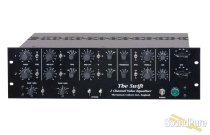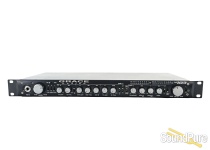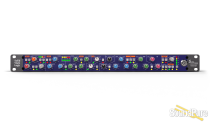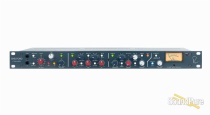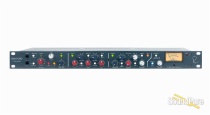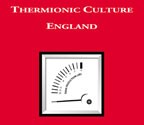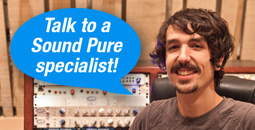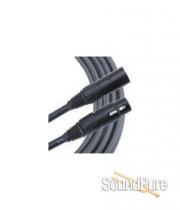-
Call Us Toll Free888-528-9703
-
Local/International (+1)919-682-5552
- Call Us! Toll Free! 888-528-9703
- Local / International (+1) 919-682-5552

Manufacturer's Description from Thermionic
The Earlybird 2.2 contains 2 channels of very high quality valve pre -amplification. The circuit design utilizes a 'push pull' 'class A' type of amplification in order to provide ultimately clean gain, giving the lowest noise and distortion figures possible in a mic pre-amplifier.
The input and output transformers have been designed by working together with Sowter transformers to provide results that are optimized for this unit. This design work provides the Earlybird 2.2 with the lowest phase shift and highest headroom possible from a mic pre- amplifier.
This version of the Earlybird pre-amp design also includes extra features such as 3 bands of active lift EQ with switchable mid range frequencies and high pass filters, and a function switch to help interface the unit in different usage scenarios.
The essential mic-preamp settings such as gain, impedance, 48v power and phase are all catered for by the front panel controls.
The active EQ uses the unique 'varislope' EQ curves for the 'bass' and 'top' lifting controls. The 'mid' lift control provides a broad, musical curve that can be centered at 800Hz or 2.8KHz by the frequency select switch. This curve interacts well with the top and bass controls to provide a wide degree of tone shaping possibilities.
As the active EQ works in the feedback part of the circuit, switching the active EQ in does not, therefore introduce any extra gain stages into the signal path. This means that the EQ can be used without fear of introducing unwanted artifacts from extra gain stages. This perhaps makes recording a little easier when a subtle amount of EQ can be added without fear of signal degradation.
The high pass filters are arranged so that the first two switch positions provide 12dB/octave filters to cut out unwanted low frequencies at 40Hz or 100Hz. The last position provides a filter with more of a shelving nature that can combine with the bass lift control to give a simultaneous mid cut and bass lift if desired.
The Function switch allows the unit to take it's input from either the 'mic in' XLR sockets, the 'Line in' sockets or the'Pullet' sockets. So the unit can be connected for different uses whilst remaining in an equipment rack. The variable impedance and pad settings on the switch allow the input circuitry of the Earlybird 2.2 to be optimized for use with a large variety of mics and signal levels. They can also be used for creative tonal choices if so desired.
We find that the variety of functions possible with the Earlybird 2.2 make it extremely versatile and coupled with the outstanding sonic results it is a great addition to any type of studio that is used to record or mix sound.
The Pullet is the perfect companion to the Earlybird 2.2 to complete a superb mastering equalizer.
Features
- 2 Channels of extremely high quality push pull' 'class A' type of valve pre amplification.
- 3 bands of active lift EQ with 2 mid range frequencies and switchable high pass filters.
- Clean gain, giving extremely low noise and distortion figures.
- Essential mic-preamp settings such as gain, impedance, 48v power and phase are all catered for by the front panel controls.
- Can be optimized for use with a large variety of mics, signal levels and different uses whilst remaining in an equipment rack.
- Function switch will allow the unit to take its input from mic in, line, or the Pullet sockets.
- Massive clean output, but can be trimmed by output level controls, some coloration can be obtained if desired.

About Manufacturer
The owners/key people involved at Thermionic Culture are totally dedicated to valve audio equipment, all having many years experience in recording and working with valves. Company founder and designer Vic Keary built his first studio in the late 50's and went onto building Maximum Sound Studios which was later bought by Manfred Mann and renamed The Workhouse, Chalk Farm Studios, and the all valve based studio Chiswick Reach.
Jon Bailes, Thermionic Culture's co-founder is responsible for the mechanical design & visual appearance. Jon has a wealth of experience as a Chief Designer in the electronic manufacturing industry .
Nick Terry engineers on many current albums and singles working recently with artists such as McAlmont & Butler, The Libertines. All this 'real world' experience is an invaluable aid to creating all valve equipment that other artists will no doubt appreciate.
Audio amplification, compression, mixing and equalisation took a backward step when solid-state technology was introduced. Valves are much more real and natural when amplifying and processing audio. We use no transistors or ICs in the signal path. Solid state is relegated to where it works best - in power supplies, although we do use a valve voltage regulator in The Culture Vulture's HT supply.
Some of our circuits take ideas from the 1940s to '60s and refine and update them to produce the low noise and distortion which are expected now. Other circuits are really original! To achieve high standards we use modern components such as 1% metal oxide resistors and polypropylene capacitors where their use is a positive advantage, but we avoid Hi-Fi type gimmicks such as gold plated XLR connectors. We take pride in the construction and reliability of our equipment. To date it is all hand wired using the best quality components. We give a 2-year guarantee against manufacturing defects, though we can only guarantee valves for 1 year. Many valves we use, are Military/Industrial grade. Also, we select and match (where necessary) all of the valves that we supply so a far longer life span can be expected
Specifications
Included are the figures for noise, distortion and EQ. They are all measured with the Earlybird set up for 44dB mic gain / 0 dB line gain and a 10kΩ load.
Input impedance:
Mic: 300Ω or 1200Ω, switchable, balanced
Pad: 1.8kΩ
Line: 12.7kΩ
Pullet: 1.2kΩ
Output impedance: <300Ω
Maximum gain: 62dB
Maximum output level (MOL): +33dBm (36V RMS)
Distortion (THD) @:
1kHz: 0.005%
100Hz: 0.01%
Frequency response
±0.5dB: 11Hz to 26kHz
±1dB: 8Hz to 65kHz
Total noise, unweighted, 30kHz filter: 114dB below MOL
EQ, active controls @ max:
Bass: +17dB@50Hz
Mid: +15dB@800Hz & 2.5kHz
Top: +20dB@10kHz
Phase shift:
HF: 16° (4.5%) @10kHz
LF: 0 within audible range
Gain settings (dB)
Mic: 36, 44, 52 & 60dB
Line: -8, 0, 8 & 16dB
High pass filter: (Hz) 0, 40, 100 & 800Hz
Output trim: -18dB to 0dB reverse linear attenuator
Input and output connectors: 8x3 pin XLRs, wired balanced
Valve complement: 2x12AX7LPS/ECC83/7025, 2x12AU7/ECC82/6189
Pilot light bulb: 24V/2.8W
Fuses: 115V: T1.25A
230V: T0.63A



